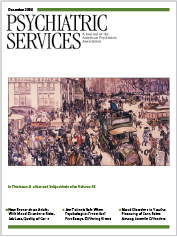Racism: A Mental Illness?
Some psychiatrists have advocated making racism a psychiatric disorder, whereas others have maintained that doing so is inappropriate because it would "medicalize" a social problem. It is amazing that neither side is willing to let scientific inquiry answer the question.
Most would agree that racism—the practice of racial discrimination, segregation, persecution, and domination on the basis of feelings and ideas of racial superiority—is mainly a product of learned behavior. After all, research informs us that a majority of explicitly racist persons do not have any psychopathology. However, isn't it possible for racism to also be a symptom of a psychiatric disorder? For example, we know that patients with a paranoid disorder project their unacceptable feelings and ideas onto other people and groups. So isn't it possible for these patients to project their unacceptable feelings and ideas onto different racial or ethnic groups? Additionally, is it possible that an individual exposed to trauma that was inflicted on him or her by a person from a different racial or ethic group might harbor racist attitudes toward that group? Furthermore, is it possible that persons with certain personality disorders—for example, paranoid or narcissistic personality disorder—might be more predisposed to racism than those who do not? These are all legitimate scientific questions that we as psychiatrists should be willing to test and answer.
Finally, isn't it possible for a European American who does not have any psychopathology but who was taught negative stereotypes of African Americans to find himself or herself in a dysfunctional employee-employer relationship with an African American who, although not anti-white, is pro-black. Wouldn't this situation be best characterized as two persons who have a relational disorder?
Because behavior is multidetermined, racism most likely has biological, psychological, and sociological origins. However, the psychiatric community has been reluctant to consider whether or not some forms of racism are manifestations of psychiatric disorders or constitute a psychiatric disorder. Maybe the question of racism as a mental illness is so contentious that it precludes consideration of the issue at all. We should let science, not our personal opinions, answer these questions. Maybe we should go a step further, and if some types of racism are found to be a mental illness or a symptom of a mental illness, developers of the next DSM should consider including other extreme prejudices, such as sexism, ageism, and heterosexism. Accordingly, some have proposed to examine "pathological bias" in a clinical context, because such an approach may lead to effective intervention with and treatment of individuals who manifest such problems.



